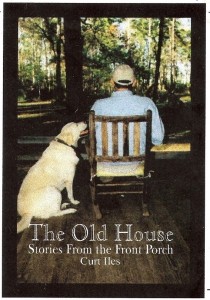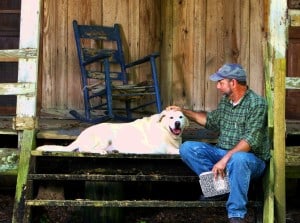
A word from Curt
Relationships.
The longer I live, the more I believe it: everything rises and falls on relationships.
This story, from The Old House, reflects that with several memorable stories.
A Bridge Built on Catfish
Driving over the small bridge across Mill Bayou, I’m filled with disgust at the trash strewn in the ditch. Scattered paper cups, empty bottles, and Styrofoam food containers are everywhere. The anger swells in me and is directed at the highway workers who left behind this trash. This crew, who are working on this bridge, left it behind from their day yesterday. The idea of people having no more pride in leaving a place better than they found it really infuriates me. I think, “Tomorrow I’m going to stop by here and give them a talk about this trash.”
Later that evening, I tell my good friend, De’Wayne Bailey, about the highway workers’ trash. De’Wayne also works for the Department of Transportation. He listens and then says, “Why don’t you just pick it up and leave the bags of trash there? They’ll get the message, and I bet they won’t leave any more trash.”
I follow De’Wayne’s common sense idea and pick up three bags of trash. I pile them by the bridge railing and leave another empty bag tied to the railing. I pass the next morning and the ten men are working at the bridge. As I pass them, I give a half-hearted wave.
At the church camp where I work, we’ve just had our monthly catfish lunch. It so happens that we had some catfish, hush puppies, and baked potatoes left over. An idea hits me and I drive back to the bridge to seek out the job foreman. He eyes me cautiously as I approach. I’m sure he is used to being chewed out and hearing every type of complaint imaginable. I simply ask, “Would y’all like to come eat lunch with us today? We’ve got some leftover catfish.”
He looks suspiciously at me, and then quickly says, “Yes.”
So at lunchtime, they file one by one into our dining hall. I mean no disrespect when I say they were a rough-looking crew. These are men who’ve worked hard outdoors all their lives. Observing them as a group, I see a really good cross-section of southwestern Louisiana—strong rednecks with bulging tattoo-covered biceps, a black man in a cowboy hat, and Cajuns with the unmistakable accent of South Louisiana. They shyly stand at the dining hall door not quite knowing what to do. The men of our staff shake their hands and welcome them, and then we ask the blessing and dig in.
There are a few foods that are just as good when heated up the second time, and fried catfish is definitely one of them. All of us go down the serving line and load our plates. Several of these bridge-builders look as if they have enough on their plate to test the weight limit on the new bridge they are building!
We all sit together at one long table. Initially everyone is pretty quiet—partly, due to our full mouths and partly due to no one knowing what to say. The only sound is the clinking of silverware as catfish meets hungry mouths.
Then something happens to break the awkward silence—I ask one man where he is from. As he tells me his hometown, it so happens I know someone from there, and from that another conversation starts. One of our staff members, Mickey Parsley, who really loves people, begins a conversation at the other end of the table. Soon there is laughter and plenty of good stories from both our staff and these men.
Most of them get up and go back for another load of catfish. They all comment on how good the meal is. You can feel the warm fellowship building in us that is always a magical part of the Dining Hall at Dry Creek Camp. As we finish the meal, the foreman makes a statement that will always stick with me. He looks me in the eye and says, “This is the first time our crew has ever had anyone do something nice for us.”
His statement astounds me, but also humbles me as I think of how close I was to stopping on the road and giving this man a royal chewing. Instead, because of God’s grace and the good advice of a friend, these men are now our new friends. The simple act of inviting them to share a leftover meal with us has opened the door of friendship.
Then I realize that the relationship we are building with these men is being built on catfish. The meal we’ve shared with them is the medium through which we’ve started the process called friendship.
Before leaving the Dining Hall, the men all thank us. Then, Bro. Mickey, who is a true man of prayer, asks them if there is anything we can pray for them about. They are silent, but as he prays God’s blessings and safety on each man, their jobs, and their families, I hear several sniffles. After the prayer there is a look in the eyes of those men that I’ll never forget.
That afternoon they are still working when I cross the bridge going home. Recognizing my truck, they all wave heartily. We are now friends because of that “bridge built on catfish.”
Driving past the waving highway workers, I recall another instance when I saw God use the “fellowship of food” to unite a group and make them feel welcome.
A few years ago, a group of inmates from nearby Phelps Correctional Center came to pick up trash along the highway in the Dry Creek area. Our agreement was for the camp to provide lunch for the twenty men and their guards.
Rea Tate, our cook at the time, prepared a wonderful country lunch—roast, sweet potatoes, turnip greens, cabbage, hot cornbread, and peach cobbler topped with ice cream. Mrs. Rea could cook anything, but her specialty was what we call “soul food.” She’d grown up in the Mississippi Delta country and knew the art of simple things cooked in heavenly ways.
At lunchtime, the inmates marched into the dining hall accompanied by the guards. You should have seen their faces when they saw the layout of food. The buffet line itself was a sight to behold.
Awaiting them were pots of steaming vegetables and sliced roast next to pans of cornbread and hot rolls. These men ate and ate, and then somehow found room for more. Rea hovered over them like the big-hearted grandma she is and made sure no one lacked any item. As they ate, I thought to myself, “They won’t be able to bend over this afternoon and pick up any trash. They’ll be too full of greens and cornbread.”
As the men finally finished, one elderly inmate sought out Mrs. Rea. He was an older black man with graying hair. Clad in his faded jeans and blue work shirt, he approached Mrs. Rea in a respectful manner and said, “Ma’am, that was the best meal I’ve had since June 23, 1974.”
. . . And his face showed he meant it. Once again, I’d seen the wonderful power of fellowship that occurs when folks sit down and share a meal together.
Passing the bridge and nearing my driveway, I recall one additional story about “relationship bridges” built on food:
About ten years ago our cemetery board of directors was dealing with a difficult and thorny matter. We planned to meet early on a Saturday morning at the cemetery pavilion to discuss this potentially divisive issue. Starting to the meeting, I was filled with a feeling of uneasiness. I knew this morning could possibly hold disagreement and hurt feelings among our nine-member board.
Before driving to the cemetery, I stopped by the camp kitchen and begged the ladies for a pan of their hot homemade biscuits. I added a jar of homemade jelly, and then picked up a cold gallon of milk and a coffeepot. It was a beautiful morning—the type of morning that always makes you glad you got up early. The special spot, here in the edge of the woods where we were meeting, only added to the peaceful atmosphere.
By the time the men started arriving, the smell of freshly brewed coffee wafted across the cemetery. It didn’t take long for the men to begin devouring those homemade biscuits. Our Dry Creek Camp biscuits are famous far and wide, and never taste better than when enjoyed outdoors with homemade mayhaw jelly. Everyone enjoyed the food, drink, and the good accompanying fellowship.
The subsequent meeting went well. There was a spirit of openness and sharing that resulted in a decision acceptable to everyone. I believe this fine spirit was a reflection of the wonderful men who sat there together. However, I also believe it was partly due to the fine biscuits and coffee we’d enjoyed together. Once again, a bridge had been built on good food.
Over and over, I’ve seen this principle of relationships work. It’s hard not to like someone with whom you’ve just sat and shared a good meal.
I once read a statement illustrating our job as followers of Jesus. It read, “Building a bridge of friendship on which Jesus can walk into the hearts of others.”
That is our job and calling—building relationships and friendships so we can both share and show others the love of Jesus. Moreover, I’ve seen this bridge best built when its foundation is a meal shared together, whether it is catfish, turnip greens, or fresh homemade biscuits.
Needless to say, the bridge crew never threw down another piece of trash. Each day they would wave enthusiastically whenever I’d pass. Finally, they finished the bridge and moved on. But even now, two years later, some of them will drop in at the camp when they are in our area.
Yes, I firmly believe the bridge built on catfish will live on . . . maybe even longer than the bridge of steel and wood these men built over Mill Bayou west of Dry Creek, Louisiana.
Learn more about The Old House.

 Creekbank Stories Curt Iles, Storyteller
Creekbank Stories Curt Iles, Storyteller
